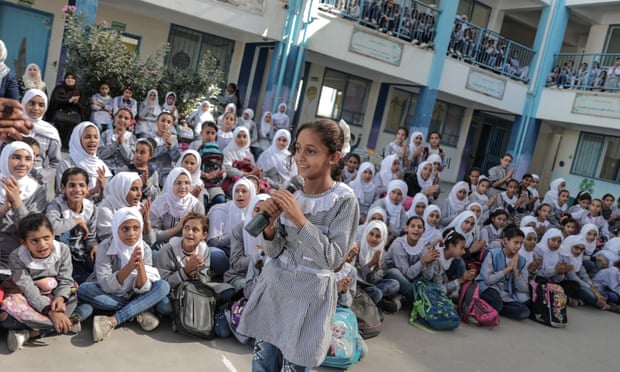Two orchestral concerts by students and graduates of Gaza’s decade-old music conservatory have been cancelled after the Hamas authorities insisted for the first time that they could not go ahead with girls and boys playing together on stage.
The Gaza music school, part of the Palestinian-wide Edward Said National Conservatory of Music, rejected a new single-sex condition which the conductor told the Observer would be a disaster for the 45-member orchestra if sustained by the de facto government.
As a result, the two annual public concerts by the Gaza Orchestra, one scheduled for earlier this month in the southern city of Khan Yunis and the other for last Thursday in Gaza City, did not take place. The concerts are usually a winter highlight for the school, which teaches both oriental and western classical music to 180 to 200 male and female pupils from the age of six or seven upwards.
The orchestra’s conductor, Anas Al Najar, 37, said the unprecedented move was “a very serious sign … After 10 or 11 years of teaching, the musicians are ready to be on the stage. To perform is every musician’s dream”. Najar, the school’s academic supervisor and a leading virtuoso on the Arabic string instrument, the qanun, said that the musicians’ parents would have been among the audience. He added: “They [the authorities] do not have more rights than the parents to stop them performing.”
The necessary police permission to hold a public event has always been granted before – most recently for a musical festival of sea and freedom held by the orchestra in October. The school points out that the musicians play as an ensemble, which could not be unravelled to allow for gender separation.
The Edward Said school is named after the celebrated Palestinian writer, academic and nationalist intellectual who was a strong promoter of Palestinian music education.
The move against mixed-sex performances follows the issuing of a fatwa in November by an Islamic preacher in Khan Yunis, which is traditionally more conservative than Gaza City. On that occasion the target was open-air performances by the separate Sol Band – a five-member group including graduates of the Gaza school, one of them a girl. The fatwa, published on Facebook, and proposing a ban by the authorities, provoked widespread debate on social media, and was denounced as possible hate speech by the respected Palestinian Centre for Human Rights.
The PCHR said the fatwa had “smeared the band members as infidels who promote obscenity” and contravened both Palestinian and international laws protecting personal freedom. It called on “the competent authorities in the Gaza Strip” formally to reject the statements by the preacher, Mohammed Al-Farra.
There have been some limits to Hamas’s interventions in Gaza’s social and cultural life – which nevertheless include gender segregation in government schools, a ban on alcohol, and prohibition of sexual relations between unmarried couples. But it is sensitive to complaints from Salafist and other ultra-conservative groups that it is not doing enough to impose a stricter Islamic regime.
Manal Awwad, the Edward Said school’s Gaza branch manager, said: “The government didn’t refuse the concert itself but they refused to have boys and girls together on the stage. And we refused to accept that idea so we delayed the concert.”
In general, the Hamas ministry of culture had supported the school’s activities, she added, but “they don’t have the decision and this is the problem”. Awwad said that the school had deliberately not yet protested against the move in the hope that the concerts could still go ahead in the future, as they had in the past.
Najar said the orchestra’s repertoire was composed mainly of “national, not romantic songs”, including ones by the revered Lebanese singers Fairuz and Marcel Khalife. He said music was a way of bringing people together. “It is the language of love and peace,” he added.
The Sol Band’s drummer, Mohammed Bashar, 21, said they had never expected the earlier controversy over their performances in public squares in Gaza City and Rafah; they had gone ahead without harassment. The band would continue to release its repertoire of 30 songs, which included non-factional revolutionary numbers from the 70s and 80s, to Falastini satellite TV at the rate of one week. And they wouldn’t be dropping their only female musician. “She is part of the band,” he said.








































admin in: How the Muslim Brotherhood betrayed Saudi Arabia?
Great article with insight ...
https://www.viagrapascherfr.com/achat-sildenafil-pfizer-tarif/ in: Cross-region cooperation between anti-terrorism agencies needed
Hello there, just became aware of your blog through Google, and found ...